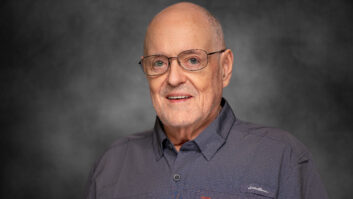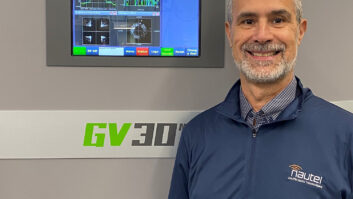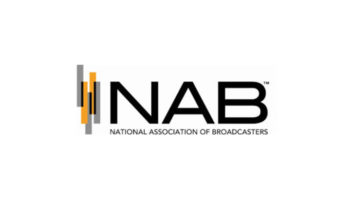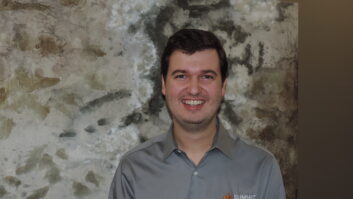The Poet Deserves Laurels
I am writing to commend Radio World on its recent article about Norman Corwin. Apart from being a concise and accurate portrayal, Vic Cox demonstrated his own wordsmith chops with aplomb.
Condensing anyone’s lifetime into one article is no easy task, but to distill the essence of Corwin and present it so effortlessly is remarkable. Like Corwin, Cox’s article delights the reader with its intelligence and grace.
Never has such a great American so carelessly and easily been forgotten. Mention the name Norman Corwin to 10 people you consider knowledgeable persons. See how many blank stares you receive in return.

Norman Corwin, right, with actor Glenn Ford. Personal collection of Norman Corwin It’s not their fault really. America moved on from dramatic radio plays and away from programs about ideals. Artful, playful arrangements of language were reduced to ad copy.
The article provides a wonderful introduction to Corwin and his best shows: “The Plot to Overthrow Christmas,” “Mary and the Fairy,” “They Fly Through the Air With the Greatest of Ease” and of course the legendary “We Hold These Truths” (the Bill of Rights four-network broadcast) and “On a Note of Triumph.”
He was given 26 consecutive weeks to write, direct and produce for “The Columbia Workshop” in 1941. Under the title “Twenty-Six by Corwin,” he wrote a new show every week for six months. He varied his topics and styles as it suited him; one week might be a comedy or satire, another week perhaps a musical or soliloquy, another week a poetic drama, and so on. His output was tremendous and his quality was amazingly high.
In his landmark hour-long show “On a Note of Triumph,” broadcast on V-E Day and repeated again eight days later, Corwin asked the big questions, not the least of which was “What do we do now?” Norman Corwin knew that peace was a fragile commodity and warned Americans that they would have to be vigilant and be willing to pass up the sports page to read the front-page headlines instead. “Peace is never granted outright,” he wrote. “It is lent and leased.”
Ultimately Corwin proved too liberal for the Cold War era. Although he still worked, he was successfully, in my opinion, removed from the national stage. Corwin was listed in the notorious smear pamphlet “Red Channels” and accused of being a Communist on the floor of the U.S. Senate by Sen. Pat McCarran.
Here was the man chosen to create the prestigious four-network Bill of Rights program in 1941 now being marginalized as a subversive less than a decade later. The fact that Corwin was never a Communist or Socialist did not matter. For a true believer in America, it had to hurt.
I have interviewed him for a documentary film called “Radio Changed America,” examining the cultural and historic impact of the medium. In doing research on this project I have become a fan and ardent lover of this man and his words. At 100 years of age Norman Corwin is still passionate about freedom and democracy. Read his books, listen to his radio plays and see if you don’t find him contagious!
His website is www.normancorwin.com, which I now oversee. My personal effort to have him honored with a Congressional Gold Medal or Presidential Medal of Freedom can be found at www.poetlaureateofradio.com.
Michael James Kacey
Los Angeles
Read His Letters
What a pleasure it is to get each issue of Radio World as it looks at the future, present and especially the past of radio — such as Vic Cox’s visit with Norman Corwin.
As it happens, last week I snagged a copy of “Norman Corwin’s Letters” (published 1994) at the Goodwill thrift store. What makes it even more enjoyable is the juxtaposition of its contents with the technology of today.
For instance, his letters often include a return address. I go to Google Maps and insert the location. Lo and behold, so that’s where Mr. Corwin was living in early 1941, just a little west of Central Park. And what’s this? Properties available at that address: one bedroom, one bath, a mere $949,000. Too much? There’s a rental for only $3,300 a month.
I know this doesn’t take away New Yorkers’ breaths, but it sure does for those of us in Texas. And it might even have the same effect on Mr. Corwin now; for in a 1947 letter he complains of Hollywood rents of $250 to $650, pushing him and his wife to buy a house “overlooking Burbank” that is “exactly 11 minutes from KNX” (when it was on Sunset near Vine).
As much fun as this is with satellite and street views, I’d still trade an evening of Internet surfing for tuning in a well-done new drama or comedy on my radio.
Bob Cockrum
Lubbock, Texas
He DX’s Digital TV
I’ve been reading with much interest the various comments on DX’ing.
In Lincoln, Neb., when I was younger, I could always get WLS and WBBM out of Chicago, KAAY Little Rock, Ark. (“Beaker Street”), KOMA out of Oklahoma City and occasionally WOAI out of San Antonio. Obviously I’m a rock ’n’ roller.
My greatest conquest was getting WCFL out of Chicago, one night only. I knew they blew their 50 kW straight into the lake.
Now I DX digital TV signals. I have a home-brew antenna, a standard UHF loop connected to two lengths of 36-inch wire connected to a 300 ohm-to-75 ohm adapter (typical cable TV type) into a RCA STB7766C converter box. I have the antenna hanging off my apartment blinds with the loop horizontal and the wires crossed; this seems to work better.
In the morning and overnight I’m getting KVOA Ch. 4, Ch. 6 PBS, KMSB Ch. 11, KOLD Ch. 13 and KTTU Ch. 18 out of Tucson.
Ch. 6 is the most consistent. I’m guessing they run horizontal and vertical polarization.
I have noticed — as has another engineer who is chief at several LPTVs for lease around the country — that DTV stations are going off the air constantly. He attributed this to their use of tube finals. He said the tubes can’t handle the “balls to the wall” modulation and break down frequently. I’ve noticed that the big boys, KPHO, the Pax affiliate, all of them, are constantly going off the air. The educational station Ch. 8 is the worst.
He indicated solid-state is the only way to go for DTV transmission for that reason. And it is true that tubes were originally meant to transmit code.
PS: To be able to pick up KOMA 1520 kHz consistently night after night was incredible. One engineer told me that if you build your AM transmitter site near a railroad hub, the rails will pick up the signal and carry it for hundreds of miles. Thought your AM readers might like to comment on that trick!
Steve Kafka
Aurora, Neb.
A Gates for Sale
The recent stories about the old Gates transmitters have been interesting — especially since I have a pristine 10,000 watt Gates FMS10H sitting in my basement gathering dust. I also have some bulbs that go along with it.
If any of your readers are interested in it, they can call me at (800) 264-5997.
Michael Daugherty
General Manager
KWWR(FM)/KXEO(AM)
Mexico, Mo.
No Issue With This Issue
We completed reading virtually every column inch — both editorial and advertising — of your issue of Jan. 12. It is as if at your editorial meeting, during which you determined which news stories, articles, illustrations, photographs and commentaries to publish in Vol. 35, No. 2, you asked yourselves, “What would ol’-time broadcaster Trantow most enjoy in our upcoming issue?”
We first turn to the always thoughtful observations of Paul McLane in his erudite “From the Editor.” We have followed the tenures of many NAB presidents, going back to Hal Fellows. So we are pleased to learn that Mr. McLane believes, “Based on early returns, Gordon Smith’s personality and style seem well suited to the task.”
Backtracking to page 1, we were fascinated with the wind-powered KBSJ article by Randy J. Stine. Also on page 1, we found Leslie Stimson’s article about message services for analog AMs of real interest.
On page 12, regarding “Old Cases Protect Fragile Gear” by John Bisset, we might mention that we use a padded laptop computer case to carry various items around safely.
While attending American University in the early 1950s, one of our instructors, Eugene Juster, then general manager of WRC Washington, devoted two or three classes to studying the work of Norman Corwin. Vic Cox’s article about Mr. Corwin brought back memories of those long-ago classes and the programs played for us as examples of superb documentaries worthy of emulation.
But that’s not all.
In reading James E. O’Neal’s review of “American Radio Networks,” we, too, are disappointed that the book did not delve into what could have been an engrossing and intriguing engineering and technical history of what we used to refer to as “AT&T Long Lines.” As we recall, there were three “classes” of AT&T lines, A, B and C. We no longer remember the frequency responses, plus-or-minus x dB, for the different classes of lines. We also would like to know how AT&T routed and connected the various network lines from station to station across the country. And we agree that the correct term for interconnected radio stations is “network.” “Web” is a Variety magazine-like term. Thanks to Mr. O’Neal’s informative review, we’ll save our $45 for some other far more informative book.
Finally, we are delighted that Radio World published excerpts from Commissioner Michael J. Copps’ speech at Columbia University. We could not agree more with Commissioner Copps’ recommendations. However, being an old-school guy, we would suggest license renewals every three years. (We well recall the work of FCC Commissioners Frieda Hennock and Wayne Coy, among others.)
Perhaps we should admit — cranky, grumpy, dyspeptic old curmudgeon that we are — that we regret the virtual elimination of many of the consequential provisions of the Communications Act of 1934, as amended, including the 7-7-7 rule. Although serving the “public interest, convenience and necessity” is mentioned briefly in pages covering AM, FM and TV stations in the Code of Federal Regulations, 47, Parts 70 to 79, “Telecommunications,” the line appears to be ignored by far too many of today’s broadcasters.
Thank you, Radio World, for yet another news-filled and thought-provoking issue.
Keith Trantow
President
Rawhide Communications
Tucson, Ariz.












